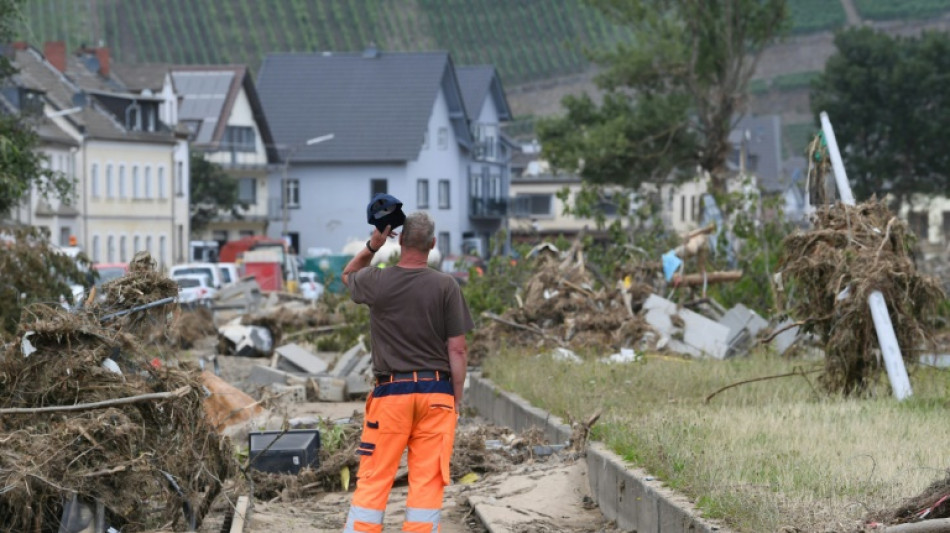
-
 Opening statements in Sean Combs trial expected Monday
Opening statements in Sean Combs trial expected Monday
-
Indian army reports 'first calm night' after Kashmir truce with Pakistan holds

-
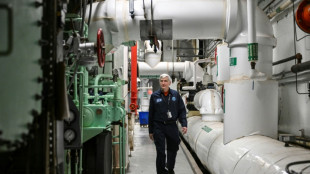 As world heats up, UN cools itself the cool way: with water
As world heats up, UN cools itself the cool way: with water
-
Pacers push Cavs to brink in NBA playoffs, Thunder pull even with Nuggets

-
 US, China to publish details of 'substantial' trade talks in Geneva
US, China to publish details of 'substantial' trade talks in Geneva
-
Asian markets rally after positive China-US trade talks
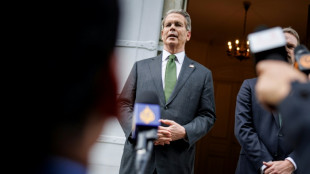
-
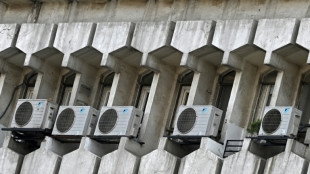 Indians buy 14 million ACs a year, and need many more
Indians buy 14 million ACs a year, and need many more
-
Election campaigning kicks off in South Korea

-
 UK hosts European ministers for Ukraine talks after ceasefire ultimatum
UK hosts European ministers for Ukraine talks after ceasefire ultimatum
-
Leo XIV gets down to business on first full week as pope

-
 White at the double as Whitecaps fight back against LAFC
White at the double as Whitecaps fight back against LAFC
-
Trump hails Air Force One 'gift' after Qatari luxury jet reports

-
 'Tool for grifters': AI deepfakes push bogus sexual cures
'Tool for grifters': AI deepfakes push bogus sexual cures
-
US and China to publish details of 'substantial' trade talks in Geneva

-
 Chinese EV battery giant CATL aims to raise $4 bn in Hong Kong IPO
Chinese EV battery giant CATL aims to raise $4 bn in Hong Kong IPO
-
Kiwi Fox wins PGA Myrtle Beach title in playoff

-
 Thunder edge Nuggets to level NBA playoff series
Thunder edge Nuggets to level NBA playoff series
-
Straka holds firm to win PGA Tour's Truist Championship

-
 Philippines heads to polls with Marcos-Duterte feud centre stage
Philippines heads to polls with Marcos-Duterte feud centre stage
-
Napoli give Inter Scudetto hope after being held by Genoa

-
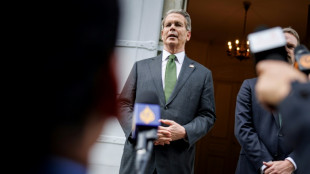 US, China hail 'substantial progress' after trade talks in Geneva
US, China hail 'substantial progress' after trade talks in Geneva
-
Blessings but not tips from Pope Leo at Peru diner

-
 Alcaraz, Zverev march into Italian Open last 16
Alcaraz, Zverev march into Italian Open last 16
-
US and China hail 'progress' after trade talks end in Geneva
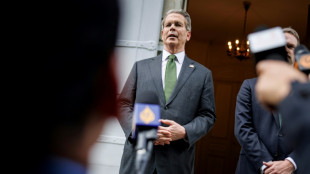
-
 Jeeno keeps cool to win LPGA's Americas Open
Jeeno keeps cool to win LPGA's Americas Open
-
Hamas to release hostage as part of direct Gaza talks with US
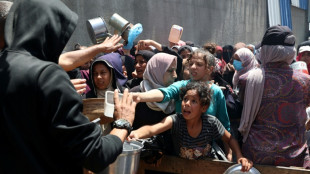
-
 Marvel's 'Thunderbolts*' retains top spot in N.America box office
Marvel's 'Thunderbolts*' retains top spot in N.America box office
-
Parade, protests kick off Eurovision Song Contest week

-
 Forest owner Marinakis says Nuno row due to medical staff's error
Forest owner Marinakis says Nuno row due to medical staff's error
-
Hamas officials say group held direct Gaza ceasefire talks with US
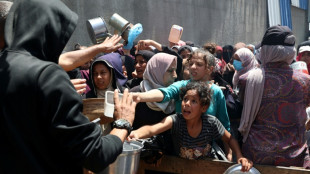
-
 Zelensky offers to meet Putin in Turkey 'personally'
Zelensky offers to meet Putin in Turkey 'personally'
-
Inter beat Torino and downpour to move level with Napoli

-
 'Not nice' to hear Alexander-Arnold booed by Liverpool fans: Robertson
'Not nice' to hear Alexander-Arnold booed by Liverpool fans: Robertson
-
'We'll defend better next season': Barca's Flick after wild Clasico win

-
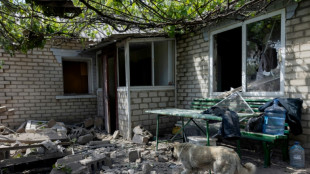 Trump urges Ukraine to accept talks with Russia
Trump urges Ukraine to accept talks with Russia
-
Amorim warns Man Utd losing 'massive club' feeling after Hammers blow

-
 Complaint filed over 'throat-slitting gesture' at Eurovision protests: Israeli broadcaster
Complaint filed over 'throat-slitting gesture' at Eurovision protests: Israeli broadcaster
-
Newcastle win top-five showdown with Chelsea, Arsenal rescue Liverpool draw

-
 Departing Alonso says announcement on next move 'not far' away
Departing Alonso says announcement on next move 'not far' away
-
Arsenal hit back to rescue valuable draw at Liverpool

-
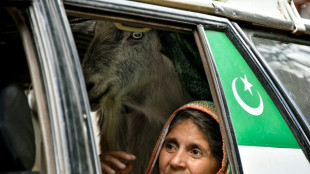 Pakistan's Kashmiris return to homes, but keep bunkers stocked
Pakistan's Kashmiris return to homes, but keep bunkers stocked
-
Postecoglou hopeful over Kulusevski injury ahead of Spurs' Europa final

-
 Washington hails 'substantive progress' after trade talks with China
Washington hails 'substantive progress' after trade talks with China
-
Barca edge Real Madrid in thriller to move to brink of Liga title

-
 Albanians vote in election seen as key test of EU path
Albanians vote in election seen as key test of EU path
-
Forest owner Marinakis confronts Nuno after draw deals Champions League blow

-
 Dortmund thump Leverkusen to spoil Alonso's home farewell
Dortmund thump Leverkusen to spoil Alonso's home farewell
-
Pedersen sprints back into Giro pink after mountain goat incident

-
 Zverev cruises into Rome last 16, Sabalenka battles past Kenin
Zverev cruises into Rome last 16, Sabalenka battles past Kenin
-
Newcastle win top-five showdown with Chelsea, Forest held to damaging draw


From bad to worse: key IPCC findings on climate impacts
With nearly half the world population "highly vulnerable" to severe climate shocks and nature facing in some cases irreversible threats, UN experts unveiled Monday a harrowing picture of global warming impacts.
Here is a rundown on some of the major findings in the Intergovernmental Panel on Climate Change's report from the key Summary for Policymakers:
- A here-&-now reality -
Severe climate impacts -- once seen as a problem on the horizon -- have become a here-and-now reality.
Global warming has already contributed to species decline and extinction; an increase in vector-borne disease; more deaths due to heat and drought; reduced yields in staple crops; water scarcity; and a decline in fisheries and aquaculture.
Climate change has adversely affected physical health worldwide, and mental health in regions where data is available. Even as needs increase, health services have been disrupted by extreme events such as flooding.
The rise in weather and climate extremes has already led to "irreversible impacts" in both human society and the natural world, the report concludes.
And it makes clear that this is only the beginning.
Impacts will intensify with every fraction of a degree of warming.
At 1.5 degrees Celsius above preindustrial temperatures, 14 percent of terrestrial species will face an extinction risk.
Meanwhile, billions more people will be exposed to dengue fever, and climate-driven extreme events "will significantly increase ill health and premature deaths".
- High tide = high risk -
No matter how quickly carbon pollution driving global warming is drawn down, a billion people will be at risk from coastal climate hazards such as increasingly powerful storms amplified by rising seas.
The population exposed to once-a-century coastal flooding will double if oceans rise 75 centimetres (30 inches), well within the range of 2100 projections. Currently, some 900 million people live within 10 metres (33 feet) of sea level.
By 2100, the value of global assets within future 1-in-100-year coastal floodplains will be about $10 trillion in a moderate greenhouse gas emissions scenario.
- 1.5C overshoot (not OK) -
In the first instalment of its trilogy of reports, the IPCC's August 2021 assessment on physical science kept alive the Paris Agreement goal of capping global warming at 1.5C.
But even then, it said temperatures would temporarily exceed that threshold, potentially within a decade.
In its latest report the IPCC outlines the stiff penalty involved in this so-called "overshoot".
Additional warming above 1.5C "will result in irreversible impacts" on ecosystems such as coral reefs, mountain glaciers and ice sheets with enough frozen water to lift ocean tens of metres.
Permafrost stocked with twice the carbon in the atmosphere could become destabilised.
"The risk of severe impacts increases with every additional increment of global warming during overshoot," the IPCC says with "high confidence".
- 'Adapt or die' -
Adaptation barely figured in the IPCC's equivalent report from 2007. By comparison, the new assessment -- the sixth since 1990 -- highlights the need to cope with unavoidable climate impacts on almost every page.
Overall, the IPCC warns, global warming is outpacing our preparations for a climate-addled world: "At current rates of adaptation planning and implementation, the adaptation gap will continue to grow."
Whether it's reducing food waste or promoting sustainable farming; restoring protective mangrove forests or building sea dams; planting urban green corridors or installing air conditioners -- the search for ways to live with climate change has become urgent.
- 'Maladaptation' & trade-offs -
The IPCC also highlights the dangers of getting it wrong at a time when there's no margin for error.
"There is increased evidence of maladaptation across many sectors and regions," the report cautions.
Building a seawall to protect against storm surges made more destructive by sea level rise, for example, may result in further development in precisely the areas most exposed to danger, creating "lock-ins" and increased exposure over the long-term.
- Tipping points & compound impacts -
The report trains a spotlight on irreversible and potentially catastrophic changes in the climate system known as tipping points that would be triggered at different thresholds of global warming.
These include the melting of ice sheets atop Greenland and the West Antarctic, which have enough frozen water to lift oceans 13 metres.
In a more immediate future, some regions -- north-eastern Brazil, Southeast Asia, the Mediterranean, central China -- and coastlines almost everywhere could be battered by multiple climate calamities: drought, heatwaves, cyclones, wildfires, flooding.
Scientists have only begun to study the impact of such compound calamites.
S.Gregor--AMWN